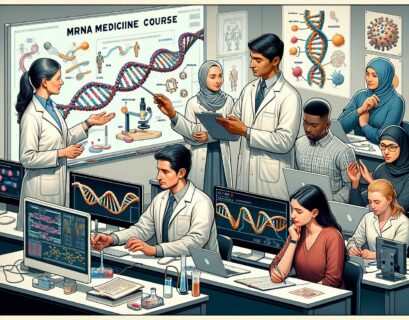Introduction
Have you ever wondered why the same pill has different effects on different individuals? Like how a pill that makes you feel drowsy for the whole day, has no effect on your friend? How the same chemical composition of a drug can impact two individuals differently? How a drug can be a miraculous life saver for one patient and prove ineffective for another patient? Isn’t it astonishing that despite the fact that we share 99.9% of our genetic material, a small 0.01% variable content determines the journey of a medicine within our bodies. This varied response to drugs by different individuals opens up a vast new field, the future of medicine: Personalized Medicine, that aims to customize a drug according to the need of a patient.
The Journey of a Drug within the Body
Pharmacokinetics depicts out how a drug travels within your body. Once you take a medicine, it is first Absorbed by the body and distributed thoroughly. The next step Metabolism, is the most crucial step in deciding the drug’s response. A person could be a rapid, slow or ultra-rapid metabolizer of a drug depending upon the type of variations in their genetic material. Once the drug is metabolized, it is excreted out of the system.

Are you new to Biochemistry, take a read here.
The genes that govern Drug Metabolism
Our body has a unique set of genes for drug metabolism. One such gene family is the Cytochrome P450, an enzyme family known for its drug metabolism properties, which can modify a drug resulting in either activating or deactivating a drug. This gene family is responsible for metabolizing around 70-80% of clinically prescribed drugs. A member of the CYP family, CYP2D6, has been in the 2006 Lancet headlines, as a culprit of fatal Morphine toxicity in Infants.
Read more about Genetics here.
A 2006 research study published in The Lancet, revealed that a painkiller Codeine, prescribed to new mothers dealing with post-partum pain, resulted in the death of a new born through the mother’s breast milk. The mother turned out to be an ultra-metabolizer of Codeine, rapidly converting it to morphine which kept accumulating in the baby’s blood and proved fatal.
How the CYP2D6 gene decided the fate of the drug?
For understanding the Lancet study, one must understand the function and variations in CYP2D6 gene sequence in different people. The genetic alterations in CYP2D6 alleles can result in structural changes in the CYP2D6 enzyme that decides the effectiveness of this enzyme in drug metabolism. By demethylation of Codeine, CYP2D6 metabolizes it into Morphine.
For understanding the Lancet study, one must understand the function and variations in CYP2D6 gene sequence in different people. The genetic alterations in CYP2D6 alleles can result in structural changes in the CYP2D6 enzyme that decides the effectiveness of this enzyme in drug metabolism. By demethylation of Codeine, CYP2D6 metabolizes it into Morphine.

We get one allele for CYP2D6 from our father and the other one from our mother. For the CYP2D6 enzyme to be perfectly functional, at least one of the two alleles for CYP2D6 should be functional. In rare cases, an individual might have three functional copies of CYP2D6 allele, making the individual an Ultra-rapid metabolizer of Codeine.

The mother from the study was an ultra-rapid metabolizer, due to which high concentrations of morphine were produced in the mother’s blood due to rapid codeine (drug) metabolism, which entered the baby’s blood stream through breast-feeding.
Pharmacogenomics
The above study clears out how genes decide the pace of drug metabolism in an individual. Pharmacogenomics as the name suggests is an amalgamation of two fields, Pharmacology and Genomics , that aims to determine the effect of an individual’s genes on drug metabolism by analyzing the unique genetic variations in different individuals. If you already know about the genetic makeup of an individual, you can predict the type of medicine that will be most effective for them and save time, money, energy and resources.
Understand more about Genome here.
Personalized Medicine: Really Possible?
Wouldn’t it be better for the patient if they could get a medicine altered according to their needs? A medicine with no adverse effect? A medicine with most efficacy? Personalized medicine follows the one-size-does-not-fit-all strategy and stresses on first detecting the genotype of an individual to analyze the genome sequence in order to jot down the unique variations in the genomes of different patients.
Detecting the Variations
To decode the mysteries of an individual’s genome, Researchers opt for various sequencing techniques to detect genetic variations like Single-nucleotide polymorphism (Single nucleotide Polymorphisms) in an individual. SNPs are the little specks on the genetic canvas, that have the power to alter the whole painting. These SNPs can not only alter the enzyme structure or function but also the drug response. So, it is very important to catch them. Sanger sequencing, Exome sequencing, Real-time polymerase chain reaction (qPCR) are some of the very efficient techniques that bring out the blueprint of the genome and highlight all the distinctions in a patient’s genetic material. The researchers can study these variations and determine the kind of medication that will benefit a patient the most.
Conclusion
Imagine a world where your personal medicine cabinet is designed according to your body, the type of drug and the ideal dose with no side effects and prompt results, just for you. Your genes are like the little keys, that decide which door to open for a drug. Once genotype profiling becomes more accessible to patients, personalized medicine plans will play a major role in making treatment decisions with minimized side effects. Targeted drug development after thorough analysis of patient’s tumor profile, will revolutionize the cancer treatment and immunotherapy options. With the expansion of pharmacogenomics data, different databases can be developed allowing the implementation of various machine learning algorithms and software development for tailored drug development. Just like architects have a house plan before building a house, your genome blueprint will provide an elaborate guide for crafting personalized treatment plans providing safer healthcare solutions.
References
- Cecchin, E., & Stocco, G. (2020). Pharmacogenomics and personalized medicine. Genes, 11(6), 679.
- Koren, G., Cairns, J., Chitayat, D., Gaedigk, A., & Leeder, S. J. (2006). Pharmacogenetics of morphine poisoning in a breastfed neonate of a codeine-prescribed mother. The Lancet, 368(9536), 704.
- Zanger, U. M. & Schwab, M. Cytochrome P450 enzymes in drug metabolism: Regulation of gene expression, enzyme activities, and impact of genetic variation. Pharmacology & Therapeutics 138, 103–141 (2013).
- https://genomind.com/providers/introduction-to-pharmacokinetics-four-steps-in-a-drugs-journey-through-the-body/
- https://www.britannica.com/science/personalized-medicine
For more intriguing insights into other STEM-related topics, visit ENTECH Online. Explore our digital magazine dedicated to inspiring teenagers and young adults to pursue their passions in science, technology, engineering, and mathematics.
FAQs
- What are the different steps of Pharmacokinetics?
Ans: Once you take a drug, it goes through various steps mainly ADME, Absorption, Distribution, Metabolism and Excretion. - Which gene family decides the pace of drug metabolism in body?
Ans: The Cytochrome P450, an enzyme family known for its drug metabolism properties, which can modify a drug resulting in either activating or deactivating a drug. This gene family is responsible for metabolizing around 70-80% of clinically prescribed drugs. - What is Pharmacogenomics?
Ans: Pharmacogenomics is the study of how a person’s genes affect the way they process medicines. This is done by looking at the small differences in each person’s genetic makeup. These differences can change how someone’s body responds to a drug. - Mention the different techniques for genome sequence analysis?
Ans: Various methods like Sanger sequencing, Whole exome sequency, q-PCR, SNP genotyping and targeted gene panel sequencing. These can be utilized for genome sequence analysis. - What are SNPs and what is their significance?
Ans: SNPs are Single Nucleotide Polymorphism. It means variations in a single nucleotide that have the tendency to alter the structure as well as the function of a protein or enzyme. Which in turn might lead to variation in drug metabolism and hence drug response. - What is the need and advantages of Personalized medicine?
Ans: Personalized medicine can make drugs work better. It can also lower the chances of side effects, which are unwanted reactions to medicine. Personalized medicine can help doctors predict diseases earlier. And it can make the process of developing new drugs faster and easier.













Very informative. All the best. Keep it up.
Engaging and well crafted. Shedding light on the use of medicines. Best wishes and keep it up.
Great article, very informative and concise.
Loved how this article made a complex topic like pharmacogenomics so engaging. Kudos to the author for shedding light on the future of personalized medicine!
“Your article is brilliantly crafted, blending clarity and depth with such ease. I am truly impressed by how you made complex ideas so accessible while keeping it engaging throughout!”
👍🏻
Very simple and easy explanation for students as well as for general knowledge for people … good work who ever has wrote this . Well done
Such a very good information dear
“You’ve put an impressive amount of work into this.”
Great work keep it up…
It is very helpful thanks
Very useful information
YOUR EXPLANATION IS A FANTASTIC KEEP IT….
It’s is very useful
Thank you!!!!
it was so informative and helpful..
Keep it up girl..
Thank you Nida!!!!
it was so informative and helpful..
Keep it up girl..
Well crafted and engaging. Concise ideas presented in a very simple way.
It is very interesting thanks
It was so informative and helpful 👍
Good job keep it up
Keep it good job
Such a wonderful information
“You’ve put an impressive amount of work into this.”
Great work keep it up…
Brilliant work nida …such information would help for precise treatment of difficult cases…
Very interesting concept explained so nicely! Well done!!
🔥🔥🔥🔥
Great work
Keep it up👍